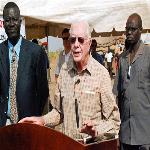12 February 2010

Photo: AFP
Former US president Jimmy Carter (C) during a press conference in the southern Sudanese village of Lojora , 11 Feb 2010
Former United States president Jimmy Carter has said he believes Sudanese President Omar al-Bashir is likely to face a second round run-off against one of his opponents in the upcoming election. He also warned of increased violence in the run-up to the April ballot.
Mr. Carter, who founded the Carter Center which is monitoring the elections, was speaking in South Sudan Thursday.
"We don't know yet whether al-Bashir can get a majority at the beginning round, if not -- which I think is likely -- then there will be a run-off between him and the second person that got the most votes," he said.
The presidential election is set to take place on April 11th along with parliamentary and regional elections.
The presidential candidate will need to win over 50 percent of votes to avoid a second round of voting.
Mr. Carter warned the election may lead to increased violence in Sudan, but said he hoped it would be kept at a local level.
"This will be an intensely competitive election with a lot at stake, and I don't think there is any doubt that there will be some altercations in the remote areas and I hope they don't expand," said the former president.
Edward Thomas, an expert on Sudan from the London-based research group Chatham House, says there will be a large number of candidates in the election and this could serve as a boost to al-Bashir.
But he says the election may be tight.
"I think one of the reasons why it's an important election is that it is quite close to call. All of the big names participating in the election are quite worried about winning and in a way that's a good sign -- it's not quite the same as being free and fair but it means that there is a contest to be had," he said.
The Carter Center is the only monitoring agency to have observed Sudan's elections from the start of the process, but it will be joined in April by observers from around the world including the European Union, the African Union and China.
April's ballot will be the country's first multi-party election since 1986.